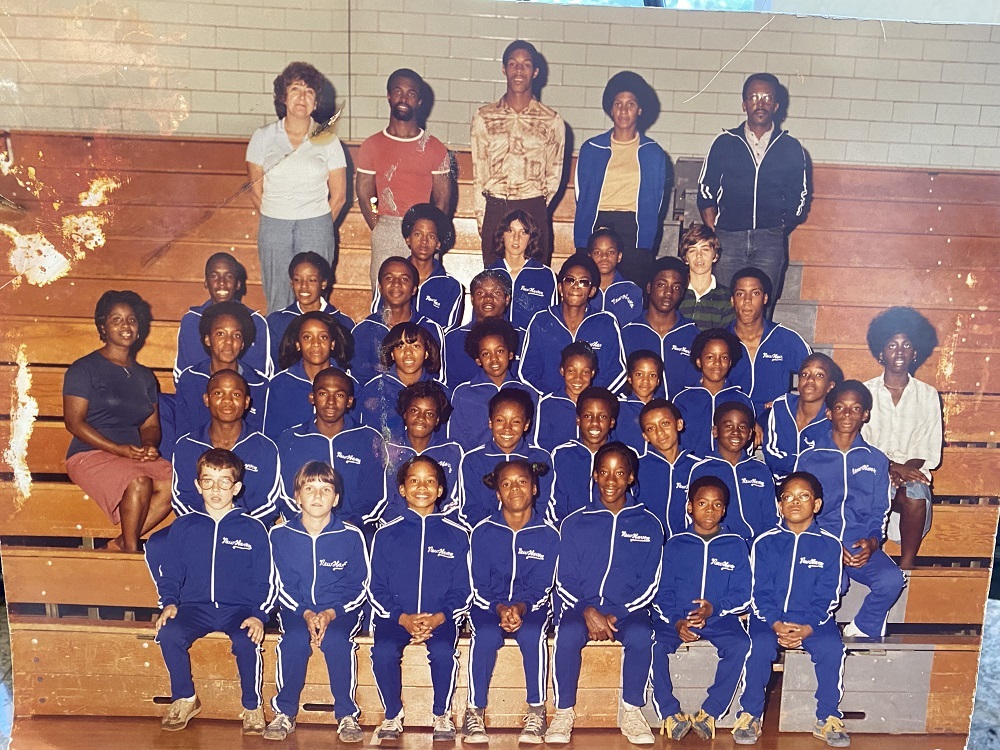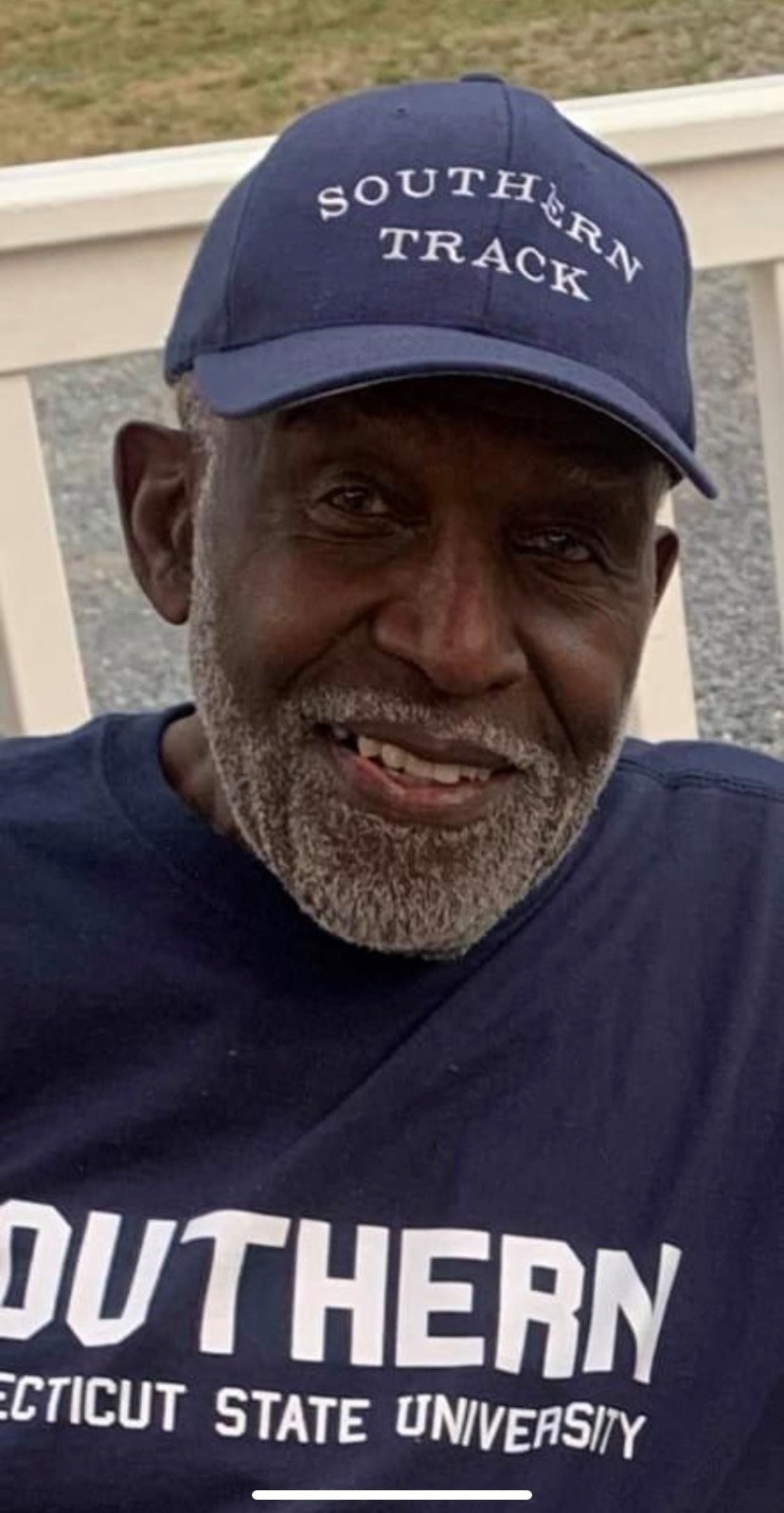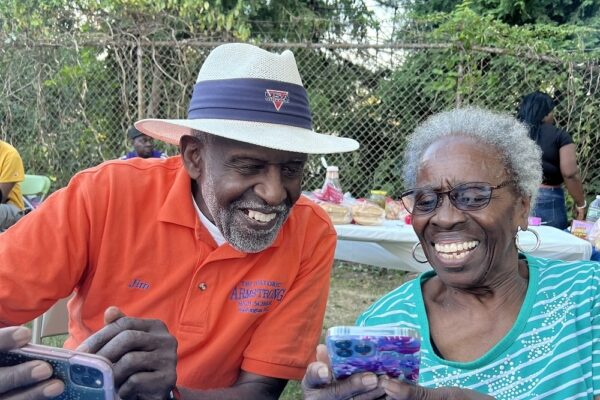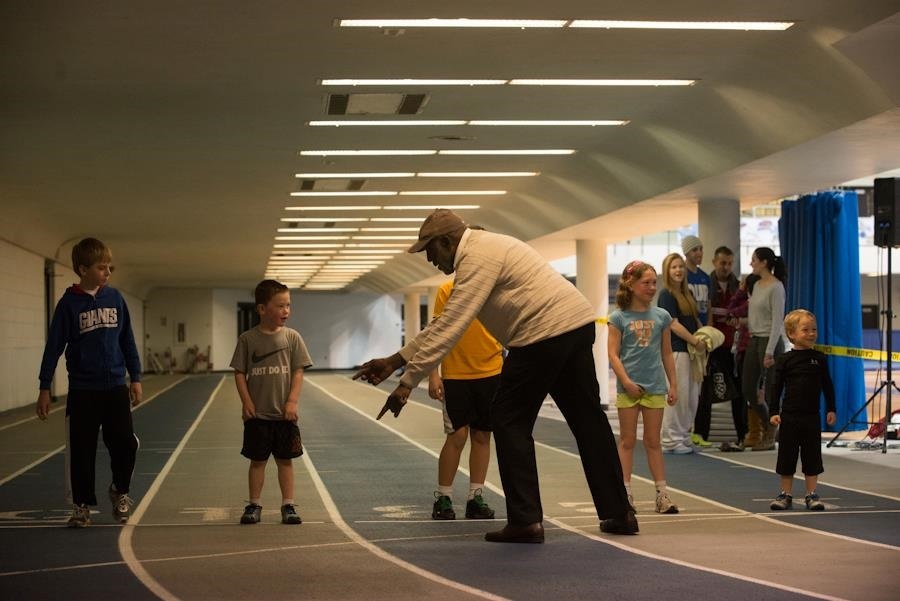Alumni of Track and Field Coaching Legend Give Back to New Haven Youth
James Barber is a legend in the world of track and field. Over a career spanning more than 50 years, he trained All-Americans and Olympic athletes. His greatest influence, however, was in New Haven, where he inspired thousands of young people to be their best, as athletes and in life. Now, an alumni network of his former athletes is honoring him with a gift that will last forever.
In the 1970s, a decade after his years as a record-breaking hurdler and football captain at Southern Connecticut State University, James Barber was at the start a coaching career that would produce some of New Haven’s most successful athletes of all time.
Already an assistant coach and administrator at his alma mater, he founded the New Haven Age-group Track Club, where kids from all corners of the city would come for the opportunity to run and throw for Coach Barber. He held training sessions after school and during summer camps on Southern’s campus.
Coach Barber had a personality that drew people in. He remembered everyone’s name the first time. He was enthusiastic, quick with a big smile, and his laugh could be heard from across the field. He was also all about hard work. Coach Barber made kids feel good and want to do good, both on the track and in their lives.

Leandrea Brantle was one of those kids. In middle school, she would ride her banana-seat bike from her Hallock Avenue home in the Hill to the Wilbur Cross High School track. The trip was three-and-a-half miles each way, and Brantle, responsible for her two younger siblings, would ride with her sister straddling the seat behind her while her brother sat on the handlebars.
At practice, she would run a one-mile warm up, do “Coach B’s” workout for two hours, then gather her siblings and pedal home. After dinner, Brantle would work out one more time. Coach B had told the team that he was selecting kids to go to the Youth Games in Detroit. He gave them a vision for what it was going to be like and the hard work it would take to make it. Brantle was determined.
“That was my first goal-setting experience and the first time I thought about something outside of my normal life up to that point. I wanted to go to Detroit, and he told me what I had to do to get there,” said Brantle.
Brantle’s four siblings also ran in the track program founded by Barber. The star of the family turned out to be the youngest, Cheryl Brantle. The child who had once watched her big sister from the sidelines became a top sprinter at Wilbur Cross High School. Her senior year, she would do a second workout at Barber’s age-group program, which helped her win state championships in her events and secure a four-year athletic scholarship to the University of Connecticut, where she became an All-American.
Tanya Sutton was another young talent to thrive with Barber. Sutton was a star thrower at Lee High School before Barber recruited her to Southern, where he was head coach for nearly 25 years.
From 1985-89, Sutton won multiple championships and set a program record in the shot put that stood for 19 years. At one point she held the American women’s record in the 20-pound weight throw, an event similar to the hammer throw.
Barber also recruited Alexandria Earl, a strong thrower and state champion at Wilbur Cross. Earl, now Earl-Givan, would go on to place second in the hammer throw when it was an exhibition event at the Olympic trials in 1992 and win gold at the Pan American Games.
Giving Back in Barber’s Name

Decades later, having gone on to successful professional careers of their own, the Brantles, Sutton, and Earl-Givan are part of a large alumni network of former Barber athletes who are giving a special honor to their coach. In the name of Barber and his mother, Claudia, they have come together from around the country to create a permanent charitable fund – the Claudia and James Barber Legacy Fund for New Haven Youth.
“He has loved and supported and encouraged generations of kids and young people. What we are doing now, is giving back, to honor him by helping the kids of New Haven,” said Leandrea Brantle, co-founder and Chief Operating Officer of Victory Human Services, the largest minority-led human services agency in Massachusetts.
“His mom is his heart and his inspiration,” Brantle continued. “We alumni are honoring the man who inspired us and the woman who inspired him.”
The network of former track and field athletes are organizing an ambitious campaign to raise several million dollars in donations to the fund, which will be used to benefit New Haven youth in perpetuity.
“Coach Barber always told us to dream big,” Brantle said. “I imagine that he is now passing that baton to us, in terms of supporting what he had done for the last 50 years,” she added. “We will not drop the stick.”

A Legacy of Excellence and Inclusion
Barber was a legendary track and field coach who trained some of the most elite athletes in the world and had a lasting influence on the sport. As head coach of the Southern Owls women’s track and field team, he recruited and coached many champions and All-Americans. On the national and international stages, he coached for the USA Team at international meets and at U.S. Olympic Festivals. He was also a respected voice within the governing bodies of the sport and was influential in advocating for the inclusion of the hammer throw as a women’s event in the Olympics.
Barber had both the technical and personal skills to coax the best out of top athletes. But his influence was even greater on the many more young people with modest athletic talents. Thousands of children and teens were coached by Barber at New Haven Age Group Track, which he founded in 1975, and he was a highly sought-after coach and mentor at Southern for more than five decades.
“His draw was, ‘I’m here to take you as far as you want to go,’” said Sutton. “Whether it was in track and field or in going for a degree, he was here for the whole person.”
Many of Barber’s athletes went on to become coaches and have successful careers outside of track and field. Sutton, who was part of Barber’s coaching tree as an assistant coach at Southern, had a front row seat to his method for making every person feel like they possessed the ability to reach their own potential.
“Most teams would cut you if you weren’t running fast, or make you a manager,” said Sutton. “Not Coach Barber. He found an event for everyone. He welcomed everybody into his family. He made every athlete feel important. Everybody mattered. That has made him so successful and so loveable and keeps drawing people to him.”
The Southern track team, a Division II program, attracted many top athletes who could have competed in Division I, according to Sutton, simply because they wanted to be coached by Barber. Athletes from the football, soccer and other teams would also seek out Coach Barber, Sutton said, as did many non-athletes looking for his advice and counsel with navigating college or issues with life outside of school.
Expanding College Access
In his job as a college administrator, Barber was instrumental in expanding access to Southern for students from minority communities. In 1971, he launched the Southern Educational Opportunity Program, which created a summer session and put supports in place for students who needed extra resources to succeed. He later led the affirmative action office and was director of student support services.
As a community volunteer, he served as president and a long-time board member of the New Haven Scholarship Fund, which has assisted generations of local high school students to pay for a college education. He was also a board member at The Community Foundation for Greater New Haven from 1980-86.
Perhaps Barber’s greatest legacy is in the relationships he nurtured and has sustained over his entire career.

“Whenever he shows up somewhere, he’s like a celebrity. He knows everybody’s name. He’s got a mind like a steel trap,” said Cheryl Brantle, who coached as an assistant to Barber at Southern. “I’m with full-grown women and we always start screaming, ‘Coach Barber is here!’ That’s the kind of love we have for that man.”
After retiring from the university in 2022, SCSU President Joe Bertolino presented Barber with the President’s Medal of Distinction.
“As a coach, an alumnus and a long-serving administrator at Southern, you have influenced and impacted students and alumni nationwide, many of whom would not have graduated without your support and guidance,” Bertolino said at the ceremony.
One of those students was the record-setting thrower Alexandria Earl-Givan. Shortly after high school, she had given birth to a baby. She was not living the life she expected but was trying to do her best to support her young family by working while also going to community college. Attending a four-year university was not conceivable.
One day, she was working at one of Barber’s summer track programs when her old coach came up and asked her why she didn’t apply to Southern.
“I said, ‘No, I’m trying to raise a family now and I’m doing something different. If I did that, who would care for my daughter?’ He said, ‘Bring her with you!’”
That fall, Earl-Givan was at the Southern track practicing her throws while Coach Barber played with her daughter on the sideline. When she could not find a babysitter, she could leave her daughter at Barber’s office during classes and take the child on the bus to track meets.
“She was the team baby,” said Earl-Givan, who would become an All-American, U.S. National Team competitor, and earn her master’s degree. She is now an assistant coach at the University of New Haven.
“Not one drop of that would have happened without him,” she said. “I call him every Father’s Day. He was there for me when I had no one. He’s like that for so many people . . . he was that guy. If you had the chance to get to know this guy, you were a lucky person.”
Do you have a Coach Barber story? Contact us.
